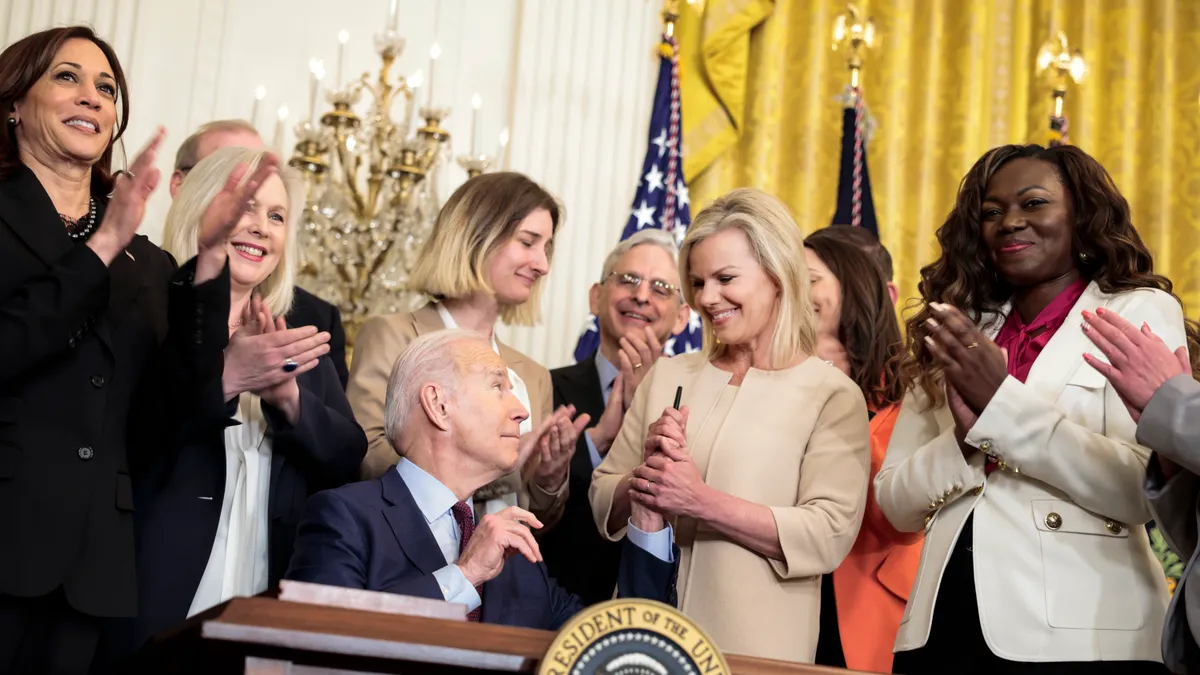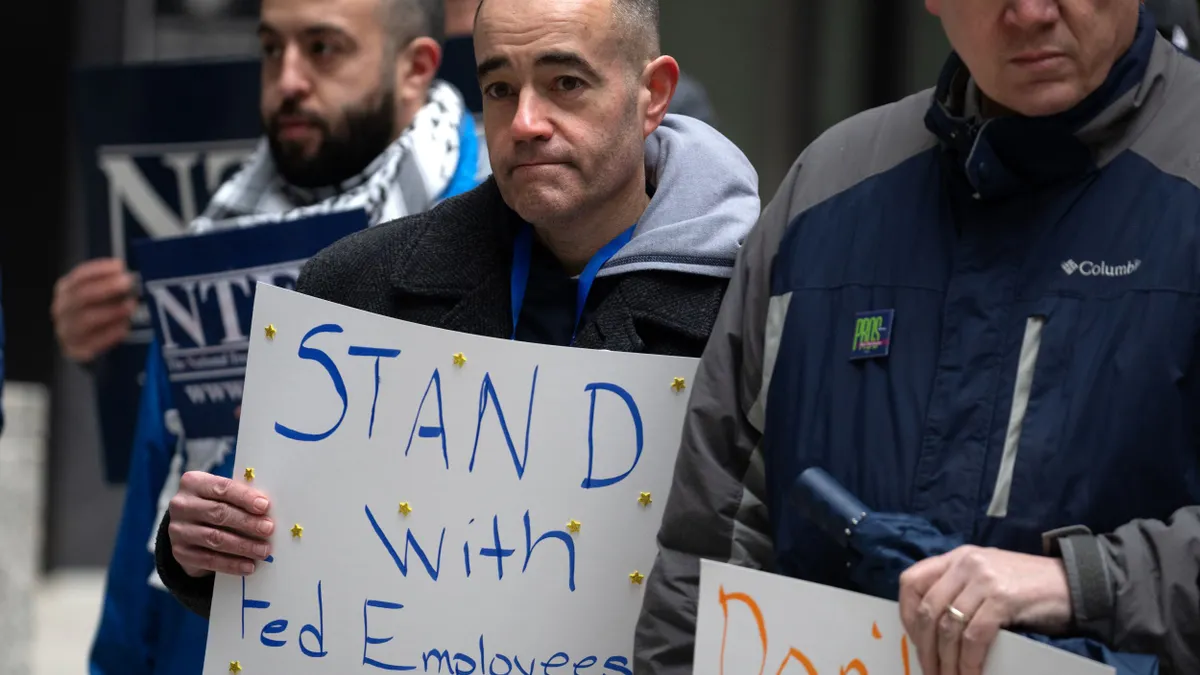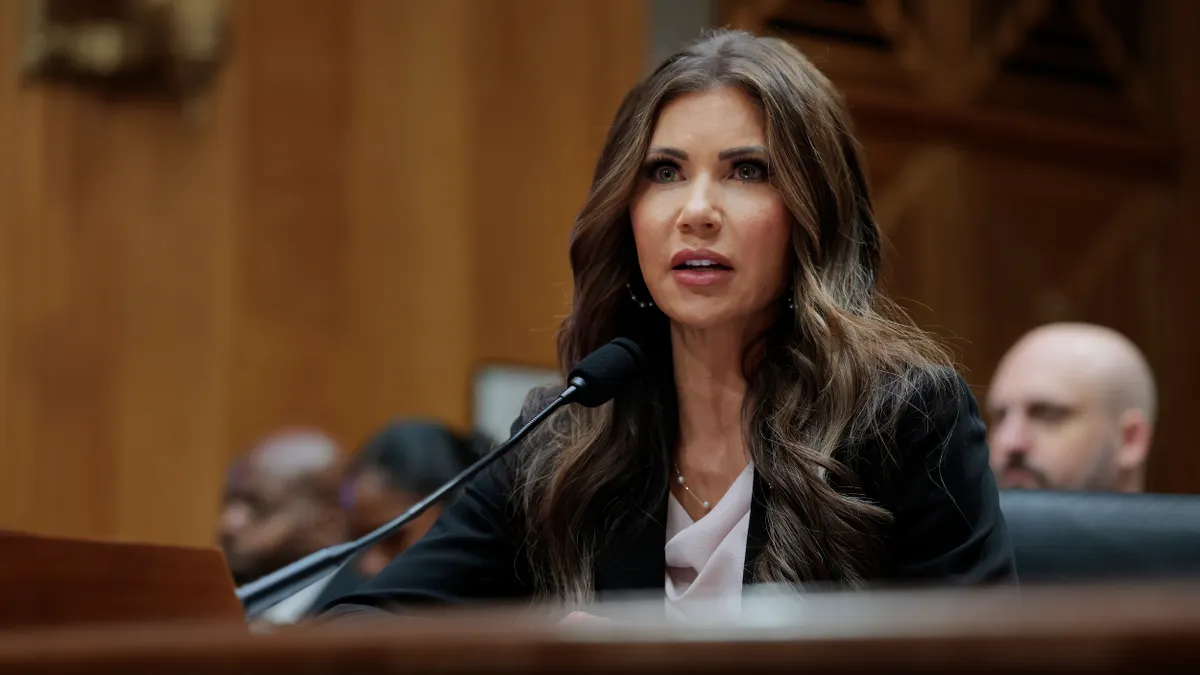Lift Our Voices, an advocacy group opposed to forced arbitration and nondisclosure agreements in the workplace, celebrated two major legislative victories last year. The first came in March 2022, when President Joe Biden signed the Ending Forced Arbitration of Sexual Assault and Sexual Harassment Act — a bipartisan bill that bans forced arbitration for cases of sexual misconduct. The second arrived a few months later, when Biden signed the Speak Out Act on Dec. 7, 2022, banning pre-dispute nondisclosure and nondisparagement agreements for instances of sexual assault and harassment.
The co-founders of Lift Our Voices, Gretchen Carlson and Julie Roginsky, don’t plan to stop there.
“Our mission is much more broad than the two laws we were able to pass,” Carlson told HR Dive in a recent interview. “Our mission is for every protected class to not be subjected to these silencing mechanisms.”
For Carlson and Roginsky, who founded Lift Our Voices after fighting separate legal battles against their former employer Fox News, legislative gains comprise only part of their mission. The bigger goal — and the harder one, they said — is cultural change. Slowly, they and other advocates are witnessing that change come to fruition, according to F. Paul Bland Jr., executive director at Public Justice, another group against forced arbitration.
“There’s an increasing awareness when people talk about arbitration clauses — that this is something corporations are using to insulate themselves,” Bland told HR Dive in an interview. “Bit by bit, there’s a growing awareness and understanding of what these things are.”
As bans spread and awareness grows, the power of widespread change remains with corporate America.
“We have penalized people who come forward,” Carlson said. “We’ve put these systems in place.”
Now, it’s time to take them back.
‘It’s a fundamental issue of equal rights’
It’s the goal of Lift Our Voices to amend the laws against forced arbitration and NDAs until they include every protected characteristic named by Title VII of the Civil Rights Act of 1964. Until that happens, workers’ rights remain imbalanced, Roginsky said. A woman who has been sexually harassed has the right to her day in court, and she can speak out about her experience. But a woman of color who has endured racial discrimination? She may lack those same rights.
“It’s a fundamental issue of equal rights,” Roginsky said. “Every American deserves to have equal rights in the workplace, especially when it comes to having a respectful workplace.”
Carlson and Roginsky started pursing legislation focused exclusively on sexual misconduct, a move they took to marshal the most bipartisan support.
“We both understood that unless it was bipartisan it was never going to pass,” Carlson said. “Our philosophy from the beginning was to take a bite out of the apple and get the first thing passed, and then come back for more.”
The battle against forced arbitration must be fought on the national level. In 1925, the Federal Arbitration Act made way for private dispute resolutions outside the judicial system for employers across the nation. But NDAs can be banned at the state level. Employers in California, Hawaii, Maine, New Jersey and Washington, for example, are no longer permitted to use NDAs that restrict employees from speaking out about discrimination or harassment.
The state laws may not carry the weight of a federal law, but their impact is still far-reaching, Carlson noted. Last year, after Washington state passed legislation banning certain NDAs, Microsoft ended its use of confidentiality clauses in its settlement and separation agreements for U.S. workers.
From Congress to culture
Roginsky noted that companies can take the cue for change before it’s mandatory.
“We’re not going to stop until we make all these laws a reality. But companies don’t have to wait for us to change the laws,” she said. “They can get rid of NDAs. They can get rid of forced arbitration. They should not wait to get on the right side of history.”
Convincing companies to make this leap is the most challenging part of Lift Our Voices’ mission.
“It was a slog to pass these laws. Walking the halls of Congress, taking any meetings we could,” Carlson said. “Changing culture is harder.”
Employers don’t want to change their operations — especially when the change could expose their “dirty laundry,” as Carlson put it. But Roginsky points to the business case for doing away with silencing mechanisms. First, she said, companies using forced arbitration or NDAs are working against their DEI efforts. “They’re effectively driving out the very people they want to retain,” she said, noting that more women than men and more Black workers than White workers are bound by forced arbitration.
Carlson echoed her co-founder’s logic. Removing forced arbitration and confidentiality clauses from their contracts requires courage from company leaders, Carlson said. “They have to know that some of their dirty laundry is going to be exposed,” she said. But companies will see benefits from the approach. They’ll see retention rise for women and people of color. And they’ll see an increase in worker morale.
#KnowYourRights
Education plays a key part in the fight against forced arbitration and NDAs. Fifty-six percent of all nonunion private sector employees are covered by mandatory arbitration agreements, according to the Economic Policy Institute, a left-leaning think tank. The practice may be widespread, but most workers have no idea they’ve signed their rights away, Carlson said.
Lift Our Voices started the #KnowYourRights campaign to educate employees about these issues and to familiarize them with the rights granted to them by recent laws.
“We want HR, companies and executives to realize employees are getting smart on these issues. That will help to push change,” she said. “We always say solving this problem is a tangled mess. It’s not just passing laws. It’s not just education. It’s all those things coming together at the same time.”





















